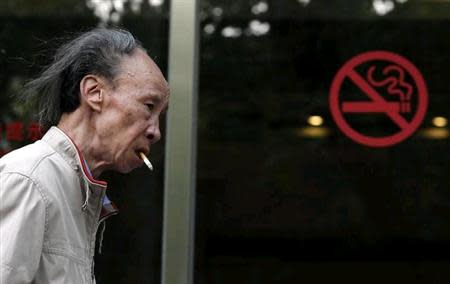WHO: China must battle vested interests in smoking fight

By Natalie Thomas BEIJING (Reuters) - China needs to take a firmer stance against its giant tobacco industry if it hopes to reduce the roughly 1 million smoking-related deaths the country sees every year, a World Health Organisation official said on Tuesday. The WHO official's remarks come as the world's largest consumer of cigarettes steps up its efforts to weed out a pervasive and destructive habit. China has adopted several anti-tobacco measures in recent months, sparking new hope for global health organisations and anti-smoking advocates. But critics say the country's powerful state-backed tobacco monopoly has opposed measures like raising cigarette prices and the use of stronger health warnings on cigarette packs, dampening plans for reform. China is home to more than 300 million smokers, with more than 50 percent of men indulging in the habit. But awareness of the health effects is low, with the WHO estimating that only a quarter of adults have a comprehensive understanding of the health implications of smoking. "China clearly needs to do much, much more if is to tackle tobacco-related illnesses," Dr Shin Young-soo, the World Health Organisation's regional director for the western Pacific, told journalists while on an official visit to Beijing. "There are strong conflicts of interests in terms of (tax) income issues." By some estimates, the tobacco monopoly has contributed as much as 10 percent of total tax revenue for China's central government. Shin said that the fact that the government still owns the majority of the cigarette factories was a key hindrance to a smoke-free environment. Rare financial data released by the country's cigarette monopoly, China National Tobacco Corp, in 2012 showed that the company had annual net income of 117.7 billion yuan in 2010, making it the biggest tobacco company in the world based on this measure. In contrast, Phillip Morris International Inc , which owns the iconic Marlboro brand, saw annual net income of $8.57 billion in 2013. In recent months Beijing has indicated it is willing to get tougher on smoking, announcing a long-awaited ban on lighting up in schools in January and calling late last year for all government officials to quit the habit. Still, authorities have historically enforced such bans only sporadically and smoking remains rampant in hospitals, offices and public places. The government also raised the average purchase price of its most common type of tobacco by 5 percent last month. It is unclear whether the increase in the purchase price would be passed onto consumers. (Editing by Megha Rajagopalan and Matt Driskill)

